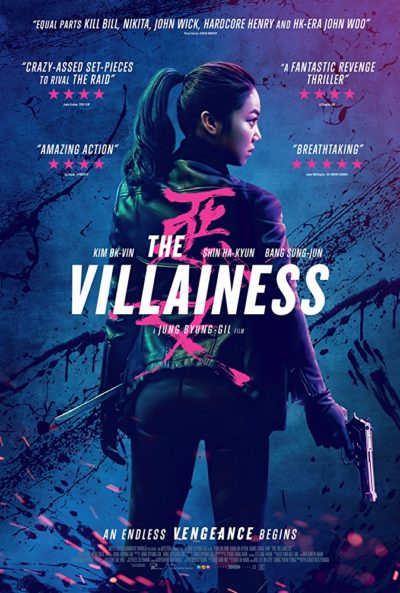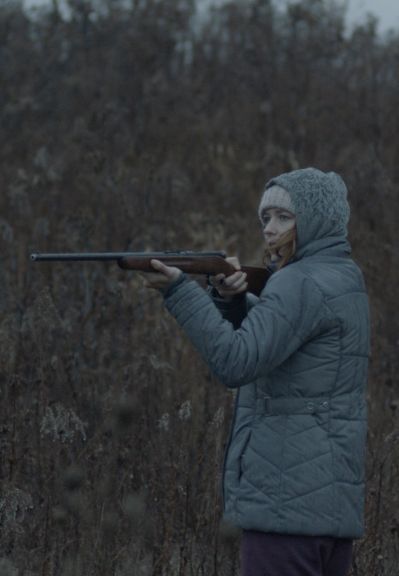★★
“Barb Wire… In space!”
 Actually, if only this had been that, it would likely have been a great deal more entertaining. The most obvious point of comparison is lead Birdsall: as the poster on the right shows, she bears more than a passing resemblance to Pamela Anderson. The setting is also dystopian SF, though even more so than in Barb Wire. This takes place after a decade-long apocalypse, which pitted mankind against the artificial intelligences we had created, they having decided we were more a problem than a solution [coughSkynetcough] What remains of the human race, is now struggling to survive in the blasted landscape which remains.
Actually, if only this had been that, it would likely have been a great deal more entertaining. The most obvious point of comparison is lead Birdsall: as the poster on the right shows, she bears more than a passing resemblance to Pamela Anderson. The setting is also dystopian SF, though even more so than in Barb Wire. This takes place after a decade-long apocalypse, which pitted mankind against the artificial intelligences we had created, they having decided we were more a problem than a solution [coughSkynetcough] What remains of the human race, is now struggling to survive in the blasted landscape which remains.
Among them is Sienna (Birdsall), who hears of a planet which contains weapons that can fry the AI circuits, before they can carry out their nefarious plan to download all of humanity’s consciousness into the Matrix. She puts together a plucky team of stock cliches – the geek (McGrath), the muscle-bound fighter (Crawford, clearly the low-rent Vin Diesel. Seriously, he used to be on the British version of Gladiators, and his character was literally called “Diesel”), the robot with a line of snappy repartee – and flies off in a spaceship to find the bombs which are humanity’s last chance. On the way, they meet up with another robot – this one a pleasure model (Park) – and learn some rather disturbing revelations about Sienna’s own past [coughTyrellCorporationcough].
These revelations do, admittedly, explain her stylistic choices – and, cynics might suggest, her approach to acting. In between a fair amount of futuristic chit-chat of varying interest value, there’s a lot of running around deserts, pretending to fire laser weapons at robotic enemies that, very obviously, aren’t there at all. The physical look of the film isn’t actually too bad; the cinematography has a fairly epic scope to it. The main problem from a visual standpoint, is the CGI has been meshed very badly with the real footage: you never escape the knowledge that the former has been pasted on top of the latter. If your script is going to span the galaxy and feature multiple human vs. robot confrontations, you need to be able to deliver. It has been twenty years since Starship Troopers came out, and its CGI still kicks this film’s ass from here to Klendathu.
While not entirely devoid of pleasures, the ones to be found here are mostly minor. Birdsall does actually have some screen presence, and certainly looks the part, in a Barbarella-esque kind of way. There’s a nice scene at the beginning, where she’s trying to escape in a car which has an auto-pilot, and it refuses to leave until it has gone through its entire checklist of new driver items. That kind of self-effacing humour is something the film needed in greater quantities, and would have helped defray the woeful inadequacy of the technical elements, for wit is cheap. Though on the evidence of this, not as cheap as the visual effects software used here. If that isn’t good enough to let the audience take your film seriously, you probably shouldn’t either.
Dir: Neil Johnson
Star: Tracey Birdsall, Tim McGrath, Daz Crawford, Ashley Park





 This opens with a blistering seven minutes of action which starts off in first-person perspective, looking like the most deranged video game ever, as the protagonist slices, dices and shoots their way through a building to a confrontation with the final boss. After being slammed head-first into a mirror, the point of view changes and we see the attacker is a young woman, Sook-hee (Kim Ok-bin). Finishing her slaughter, she calmly accepts arrest, but the Korean intelligence services recruit her, hoping to channel her skills to their own ends, after a spot of plastic surgery to ensure a fresh start. When training is completed, under Chief Kwon (Kim Seo-hyung), she’s given an apartment, unaware that the man next door, Jung Hyun-soo (Sung), is actually her handler. However, he’s not the only person with something to hide. Because Sook-hee is out to leverage her new position, and is still after long-awaited revenge on the man who killed her father.
This opens with a blistering seven minutes of action which starts off in first-person perspective, looking like the most deranged video game ever, as the protagonist slices, dices and shoots their way through a building to a confrontation with the final boss. After being slammed head-first into a mirror, the point of view changes and we see the attacker is a young woman, Sook-hee (Kim Ok-bin). Finishing her slaughter, she calmly accepts arrest, but the Korean intelligence services recruit her, hoping to channel her skills to their own ends, after a spot of plastic surgery to ensure a fresh start. When training is completed, under Chief Kwon (Kim Seo-hyung), she’s given an apartment, unaware that the man next door, Jung Hyun-soo (Sung), is actually her handler. However, he’s not the only person with something to hide. Because Sook-hee is out to leverage her new position, and is still after long-awaited revenge on the man who killed her father.
 An interesting premise gets wasted, buried under a muddied writing style which sets up in one direction, then abandons it for another. Orphan Kalinda has been brought up by The Sisterhood in their remote temple in the mountains (kinda Indian, kinda Sumerian, annoyingly non-specific), training in the ways of a warrior – though others have far more talent in the era. Her life is upended when the local monarch, Tarek, visits the temple and selects Kalinda to be his next wife. Next, as in he already has 99, not to mention his additional courtesans. The problem for Kalinda is, this sets up a tournament in which she can be challenged by the other women, who seek to supplant her.
An interesting premise gets wasted, buried under a muddied writing style which sets up in one direction, then abandons it for another. Orphan Kalinda has been brought up by The Sisterhood in their remote temple in the mountains (kinda Indian, kinda Sumerian, annoyingly non-specific), training in the ways of a warrior – though others have far more talent in the era. Her life is upended when the local monarch, Tarek, visits the temple and selects Kalinda to be his next wife. Next, as in he already has 99, not to mention his additional courtesans. The problem for Kalinda is, this sets up a tournament in which she can be challenged by the other women, who seek to supplant her. There’s a lot of chit-chat about face, honour and respect here. It begins when the master of a kung-fu school, Lau, has his daughter kidnapped by local hoodlums, after he won’t cough up protection money. Perhaps surprisingly, rather than using his skills to kick their arses, he sends two students to Thailand, including his son, Hong (Wong) in an effort to win the necessary funds. Hong loses, the other student is killed, and Lau is drummed out of the local Kung-Fu Association for having disgraced the name of Chinese martial arts by losing to foreigners. He’s so devastated, he hangs himself, leaving it up to his daughter, Siu Fung (Mao) to restore the family name, learn how to mesh Chinese kung-fu with Thai boxing, and rescue her sister. Quite the “to-do” list, I’d say.
There’s a lot of chit-chat about face, honour and respect here. It begins when the master of a kung-fu school, Lau, has his daughter kidnapped by local hoodlums, after he won’t cough up protection money. Perhaps surprisingly, rather than using his skills to kick their arses, he sends two students to Thailand, including his son, Hong (Wong) in an effort to win the necessary funds. Hong loses, the other student is killed, and Lau is drummed out of the local Kung-Fu Association for having disgraced the name of Chinese martial arts by losing to foreigners. He’s so devastated, he hangs himself, leaving it up to his daughter, Siu Fung (Mao) to restore the family name, learn how to mesh Chinese kung-fu with Thai boxing, and rescue her sister. Quite the “to-do” list, I’d say. Del Castillo is the undisputed queen of the action telenovela. She made her name as the original “Queen of the South” in one of the most popular entries ever,
Del Castillo is the undisputed queen of the action telenovela. She made her name as the original “Queen of the South” in one of the most popular entries ever,  A viral plague has decimated mankind, turning its victims in mindless, flesh-craving ghouls. One of the few to have survived is Ann (Walters), who has taken up residence in the woods, where she has camped out. Ann uses the survival skills she received from her now-absent husband, Jason (West), only occasionally having to emerge and risk the threat of the infected, in order to gather supplies. Her secluded, yet relatively safe existence is disturbed, when she finds an injured man, Chris (Thompson) and his teenage daughter, Liv (Piersanti) on a road. They are supposed to be on their way north, to where the epidemic is reported to be in check. Yet Chris, in particular, seems curiously unwilling to be on his way.
A viral plague has decimated mankind, turning its victims in mindless, flesh-craving ghouls. One of the few to have survived is Ann (Walters), who has taken up residence in the woods, where she has camped out. Ann uses the survival skills she received from her now-absent husband, Jason (West), only occasionally having to emerge and risk the threat of the infected, in order to gather supplies. Her secluded, yet relatively safe existence is disturbed, when she finds an injured man, Chris (Thompson) and his teenage daughter, Liv (Piersanti) on a road. They are supposed to be on their way north, to where the epidemic is reported to be in check. Yet Chris, in particular, seems curiously unwilling to be on his way. After breaking up with her boyfriend, Gloria (Hathaway) holes up in her middle-American hometown. She gets a job in a bar, run by her childhood pal, Oscar (Sudeikis) – not that this employment does much for Gloria’s burgeoning alcoholism. Meanwhile, over in Korea, the city of Seoul is being plagued by a giant monster, which will appear out of nowhere, behave oddly, and then vanish again. Gloria eventually figures out that when she goes through a particular spot – a local children’s playground – at a specific time, the creature appears in Korea, and its actions reflect hers. Turns out Oscar can do the same, manifesting in Seoul as a giant robot, and he may not be as benign with his new-found powers, as Gloria is attempting to be.
After breaking up with her boyfriend, Gloria (Hathaway) holes up in her middle-American hometown. She gets a job in a bar, run by her childhood pal, Oscar (Sudeikis) – not that this employment does much for Gloria’s burgeoning alcoholism. Meanwhile, over in Korea, the city of Seoul is being plagued by a giant monster, which will appear out of nowhere, behave oddly, and then vanish again. Gloria eventually figures out that when she goes through a particular spot – a local children’s playground – at a specific time, the creature appears in Korea, and its actions reflect hers. Turns out Oscar can do the same, manifesting in Seoul as a giant robot, and he may not be as benign with his new-found powers, as Gloria is attempting to be. That would have been a more appealing title. Although the incredibly generic one here reflects the incredibly generic plot, which sinks this, despite the efforts of a well above-average cast. CIA agent Alice Racine (Rapace) has, at her own request, been assigned to the backwater of an East London community, after blaming herself for failing to stop a bombing in Paris. She’s called out of her semi-retirement to interrogate a terrorist courier, believed to be carrying a message about an imminent biological attack on a US target in London. She cracks the subject and hands over most of the intel, only to discover the recipients are not the agency employees they claimed to be, and will kill her as soon as they get what they need. She goes on the run, unsure of who she can still trust: her mentor (Douglas), the MI-5 boss (Collette), or a burglar she encounters who happens to be a former British commando (Bloom). Can she stop the attack before it’s carried out?
That would have been a more appealing title. Although the incredibly generic one here reflects the incredibly generic plot, which sinks this, despite the efforts of a well above-average cast. CIA agent Alice Racine (Rapace) has, at her own request, been assigned to the backwater of an East London community, after blaming herself for failing to stop a bombing in Paris. She’s called out of her semi-retirement to interrogate a terrorist courier, believed to be carrying a message about an imminent biological attack on a US target in London. She cracks the subject and hands over most of the intel, only to discover the recipients are not the agency employees they claimed to be, and will kill her as soon as they get what they need. She goes on the run, unsure of who she can still trust: her mentor (Douglas), the MI-5 boss (Collette), or a burglar she encounters who happens to be a former British commando (Bloom). Can she stop the attack before it’s carried out? Manchester Detective Sergeant Jan Pearce is part of an investigation into local crime lord, Connelly, whose family has managed to evade the reach of the law for decades. Indeed, this is the second recent investigation, the previous effort having collapsed, apparently due to procedural blunders. But the boss isn’t taking it lying down, beginning a campaign of intimidation against those investigating him. This hits DS Pearce, with the disappearance of her teenage son, Aiden: she’s convinced this is retribution from Connelly. But neither her colleagues on the force, nor her ex-husband, Sal, agree – they think Aiden simply ran off.
Manchester Detective Sergeant Jan Pearce is part of an investigation into local crime lord, Connelly, whose family has managed to evade the reach of the law for decades. Indeed, this is the second recent investigation, the previous effort having collapsed, apparently due to procedural blunders. But the boss isn’t taking it lying down, beginning a campaign of intimidation against those investigating him. This hits DS Pearce, with the disappearance of her teenage son, Aiden: she’s convinced this is retribution from Connelly. But neither her colleagues on the force, nor her ex-husband, Sal, agree – they think Aiden simply ran off.